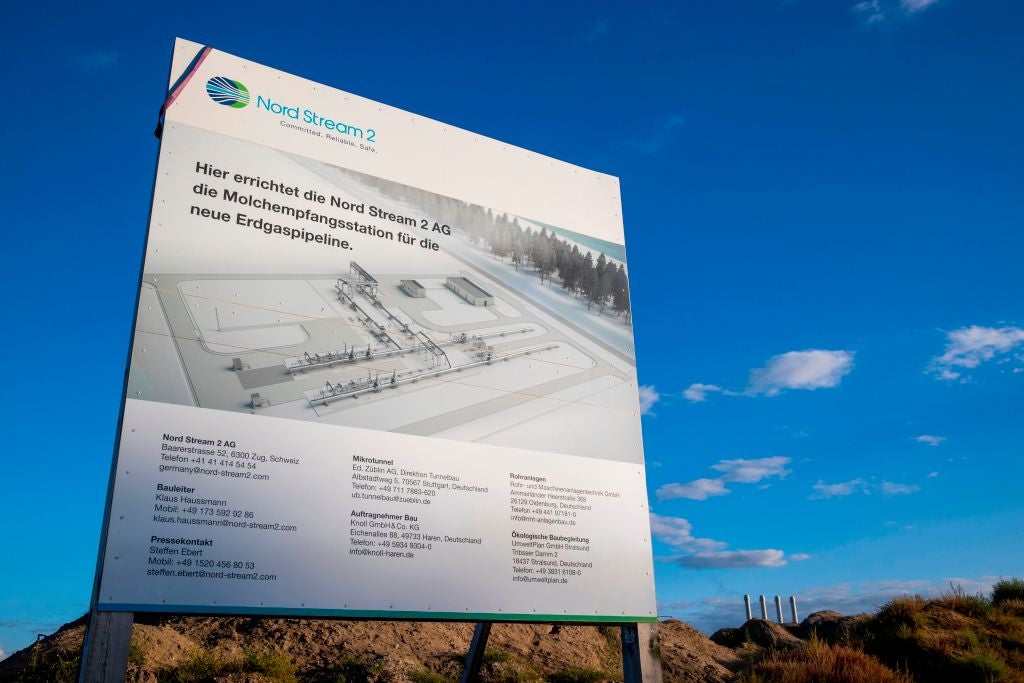
Russia’s attack on Ukraine has taken financial markets by surprise and its consequences are already having a severe impact upon energy, transport and logistics, stocks and assets.
Here, Investment Monitor looks at the specific assets that have been affected – or halted altogether – in the aftermath of the invasion.
Germany pulls the plug on Nord Stream 2
Before Russia invaded Ukraine, the German government had already taken action by suspending approval of the Nord Stream 2 pipeline project. This is a 1,200km pipeline under the Baltic Sea that is designed to take gas from the Russian coast near St Petersburg to Lubmin in Germany.
Russian state-owned energy company Gazprom contributed to half of the total €10bn ($11.2bn) project cost, with energy companies Shell and Engie covering the rest.
Nord Stream 2 runs parallel to the existing Nord Stream pipeline, which has been operational since 2011. The two pipelines would together deliver 110 billion cubic metres of gas to Europe, more than one-quarter of the total gas supply that EU countries use annually.
The move from the German government came as a response to Russia’s recognition of the Donetsk and Lugansk People’s Republics before the military attack was launched and it is aimed at reducing Russia’s stranglehold over Europe’s energy supplies.
“The move in the European natural gas market has stood out, with the market rallying after Germany decided to suspend the approval process for the Nord Stream 2 pipeline. The pipeline is not operational and so should not directly impact flows,” says a note from Dutch financial services company ING.
“However, the market had been expecting that when the pipeline became operational, Russia would increase flows once again and help ease the tightness in the European market. Instead, the market could potentially tighten further, leaving Europe in a vulnerable position for another heating season.”
Oil and transport hit by Ukraine invasion
Private investors and asset managers expect volatility and uncertainty to continue in the energy, oil and transport sectors. “We don’t expect to see major retaliation related to energy, as this is not in the interests of either Russia or Europe,” says a note from French asset manager Amundi.
However, oil prices and commodity dynamics are key variables to watch.
“Oil prices jumped above $100 per barrel for the first time since 2014,” adds the note. “We will see an increase in negotiations to ensure sufficient supply to avoid an oil shock, with the possibility that Iran and Saudi Arabia open up reserves.
“An oil rise is a major source of inflationary risk at a time of already-hot global inflation. In addition, Russia is a global producer of other commodities (palladium, platinum and wheat, for which Ukraine is also a leading producer), where prices also are surging, adding inflationary pressure.”
“Oil and gas prices are likely to stay highly elevated with hard-hitting sanctions set to be imposed by the international community,” says Susannah Streeter, senior investment and markets analyst at financial services company Hargreaves Lansdown.
“Market volatility has increased since the beginning of the year, stoked by rising interest rates, and [the latest] news has added fuel to the market turbulence.”
Asset manager Columbia Threadneedle’s global chief information officer, William Davies, also has concerns over the impact of the conflict on energy prices. “We expect to see an increase in energy prices and grain prices across emerging markets, which is likely to have an impact on commodities globally,” he says.
“As with other major geopolitical situations we anticipate there will be volatility in markets, and while we invest with conviction we do not ignore the impact of globally driven events on the companies and industries in which we invest, in addition to the impact on economies more broadly.”
Just as it started to recover from the hit it had suffered during the Covid-19 pandemic, the air transport sector is also being watched with some concern by investors.
“With Ukrainian airspace shut, and fears that renewed optimism of the travelling public will be severely dented with war under way, that has led to a big slide in airlines and travel sector stocks,” says Streeter.
“International Consolidated Airlines Group, the owner of British Airways, has dropped by about 5%, while Wizz Air, with its extensive operations across eastern Europe in particular, nosedived by about 8% in early trade. Rolls-Royce, so highly reliant on commercial air travel, was among the biggest fallers on the FTSE 100 given that it is highly reliant on commercial air travel.”
However, the analyst urges investors to not panic, but take the time to ensure that they have a diversified portfolio with a basket of assets spread across different sectors and geographies.
Logistics and supply chain fears amid conflict
The conflict is also likely to have a strong impact on global supply chains, another industry that has already suffered due to the pandemic.
“Russia’s invasion of Ukraine will undoubtedly have significant repercussions for global supply chains in the weeks and months ahead,” said John Denton, secretary-general of the International Chamber of Commerce, in a note on the topic. “The likely impact on energy and food markets is already well known – but we also see a deeper risk of disruption to manufacturing globally across a broad range of sectors.”
Sanctions aside, the production of semiconductors, automobiles and medicines “will be severely impacted by the disruption of legitimate business activities in Ukraine – which, in recent years, have become a key supplier of essential metals and raw materials into global value chains”, Denton added.
As the Russia-Ukraine crisis continues to unfold, investors will remain vigilant as more uncertainty and volatility is expected both in real assets and across financial markets.


